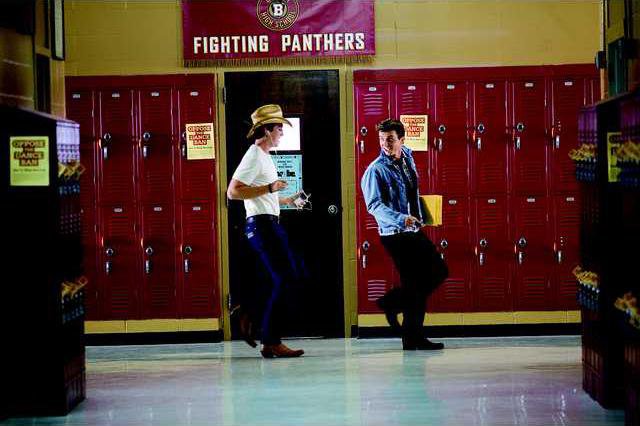Footloose Starring: Kenny Wormald, Julianne Hough, Dennis Quaid, Miles Teller, Ray McKinnon, Kim Dickens Rating: PG-13, for some teen drug and alcohol use, sexual content, violence and language Runtime: 1 hour, 53 minutes Bottom line: Great Georgia talent stuck in a mediocre movie
As the prophetic philosopher Huey Lewis once wrote, "Gotta get back in time." What Professor Lewis obviously meant is that the movies desperately need to get out of the ’80s and return to the present. "Footloose" continues the flood of ’80s remakes flowing out of Hollywood, and like all the other movies in that trend, the results are underwhelming. The story is exactly the same as the 1984 movie starring Kevin Bacon, which was a bona fide phenomenon for the ’80s generation. Headstrong teenager Ren (Kenny Wormald) moves from the city to the country to live with his uncle Wes (Ray McKinnon) and aunt Lulu (Kim Dickens). He doesn’t fit into this small town, where loud music and public dancing are both against the law. Ren quickly makes an enemy in the local preacher (Dennis Quaid), a best friend in Willard (Miles Teller) and a love interest in the preacher’s troubled daughter, Ariel (Julianna Hough). Ren eventually petitions to change the law and gets some help putting on a dance. For most of the movie’s rather long 113 minutes, it is a word-for-word, beat-for-beat redux of scenes from the original. It opens with a montage of dancing feet. Ren gets a traffic ticket for playing loud music. Willard learns to dance over the course of a montage. "Footloose" is at its worst during these scenes. They display an utter lack of imagination and effort by the writers and director Craig Brewer ("Hustle and Flow"), and the actors just go through the motions. These scenes would have been just as effective if they had used the same footage from the 1984 movie and added an updated soundtrack. The movie is remarkably better when it deviates from the original. Ren moves from Boston to Bomont, Ga. (the movie was filmed mostly in North Georgia, and our own backyard looks great) because his mother recently died from leukemia. Uncle Wes sticks up for Ren, particularly in one heated exchange with the preacher in which Georgia native McKinnon delivers the best scene of the film. Ren and the preacher have a heart to heart in the church that also works surprisingly well. These new scenes and a winning performance from Teller rescue the movie from being a disaster. Watching "Footloose" is no different from seeing a cover band. The faithful covers are OK but forgettable. It’s only when they reinvent a song that we really take notice. The worst thing about "Footloose" is that it doesn’t reinvent the original enough. It seems a good time to ask: Why is Hollywood remaking so many ’80s movies? We have to remember first that none of this is new. Hollywood has always wanted a reasonably sure return on investment. Remakes of and sequels to known properties are better financial bets than original product. We movie buffs and purists beat our heads against the wall about it, but it really is that simple. Hollywood is on a genuine ’80s kick, though. Between "Tron: Legacy," "Footloose," "The Thing," "The Smurfs," "Arthur," "Conan the Barbarian" and others, for much of the past year I have felt like I time-warped back to my adolescence. It isn’t going to stop for a while, either. Remakes of "Top Gun," "Teen Witch," "Red Dawn" and "Dirty Dancing" are all in the pipeline. But as the sage Prof. Lewis wrote elsewhere, "Lightning never strikes twice." So wise, yet such great hair. With the exception of "The Smurfs," which has performed well internationally, this ’80s obsession has been a disaster. None of the movies has reached the same level of success as its predecessor. We can look to "Footloose" to understand why. In a time when movies are more readily accessible at home than they have ever been, it takes more than a tired rehash to pull people into theaters. The movie industry is usually very responsive to consumer demand, but they are not getting the message when it comes to reliving the ’80s.
Jeff Marker is a media studies professor at Gainesville State College.

